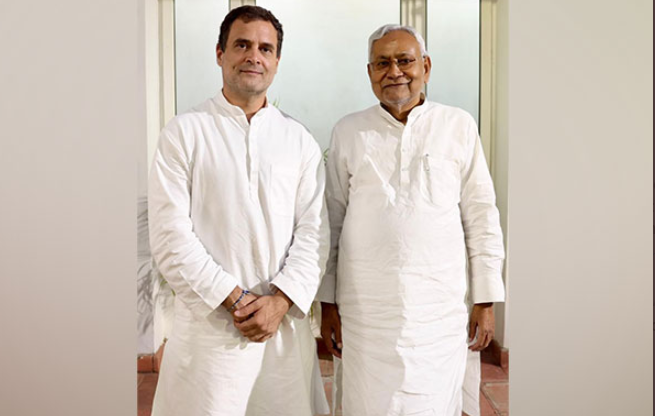
7 things to watch out for at June 23 Opposition meeting in Patna
Seat sharing, leadership, common minimum programme could prove obstacles

With less than 11 months left for the 2024 general elections, opposition parties are taking steps to put their house in order to give a determined and united contest to defeat the Bharatiya Janata Party (BJP).
The first meeting of the opposition parties in Patna on Friday, June 23, is expected to turn into a show of strength against the BJP-led National Democratic Alliance (NDA) of Prime Minister Narendra Modi.
Some crucial issues that could come up for discussion are:
1. One Seat, One Contest: Opposition leaders are making efforts to ensure that there is one candidate against the BJP in each of the 543 Lok Sabha constituencies so that all opposition parties pool their resources and combine their efforts to defeat the ruling party.
Also read: 4 tasks that could challenge Nitish Kumar at June 23 Patna Opposition meet
While it seems difficult that all opposition parties could agree on one candidate for each of the constituencies, some senior leaders believe this formula could be possible in at least 450 seats if all opposition leaders agreed to sacrifice some of the seats they would ideally want to contest.
2. Seat sharing difficulties: Even as opposition parties have agreed to come together against the BJP, and this is no small development, most regional parties have severe rivalries with Congress or smaller regional outfits. The biggest contradiction is in Kerala where the Congress is standing against Left parties whereas the two political groups are in alliance in West Bengal and Tripura.
Similarly, there is contradiction in West Bengal, where Chief Minister Mamata Banerjee faces opposition from the Congress and Left parties. Banerjee is against the involvement of Left parties in the opposition alliance. She has conveyed her reservations about Left parties to Nitish Kumar. Banerjee is also eyeing political space in Jharkhand, Tripura, Assam and Meghalaya as she plans to expand the voter base of the Trinamool Congress.
Analysis: Dalit leaders Mayawati and Manjhi opting out of alliance could hurt Opposition
Another area of contradiction is between Congress and the Aam Aadmi Party (AAP). It will be interesting to see if the two rivals come together to defeat a common enemy in BJP. While AAP rules Delhi and Punjab, Congress wants to take control of the political space in both these places. AAP wants an understanding with Congress in Haryana, Rajasthan and Gujarat, but Congress is not keen to give space to AAP under Delhi chief minister Arvind Kejriwal.
3. Congress party revival: The success of the opposition parties against the BJP depends on the success of the Congress and its revival as a political force in the 2024 general elections. The importance of Congress could be understood from the fact that there are at least 200 Lok Sabha seats, especially in Madhya Pradesh, Chhattisgarh, Karnataka, Rajasthan, Gujarat, Delhi, Haryana, Himachal Pradesh, Assam and Uttarakhand where the two national parties are at direct loggerheads. If the Congress can manage to improve its strike rate against BJP, it can expect to revive itself as political force in the country.
Also read: Despite Karnataka win, why it’s going to be tricky for Oppn in 2024 polls
4. Finding a leader: The BJP leadership has often posed this question to opposition parties. It seems the opposition parties would present a collective leadership instead of choosing one candidate against PM Modi. Most opposition leaders feel their first imperative is to defeat the BJP in the national polls. Only then will the parties collectively decide on the Prime Minister’s name.
5. Importance of regional parties: The emergence of the BJP under Prime Minister Narendra Modi with a full majority government at the Centre in the last decade has shrunk the political space for regional parties in national politics.
The role of regional parties could hold the key to the 2024 general elections if opposition parties want to challenge the BJP. It is expected that if the opposition parties want to reclaim their political importance from the BJP, then the electoral contest in Uttar Pradesh, Bihar, Maharashtra, Jharkhand, Andhra Pradesh, Tamil Nadu, Delhi, Punjab and Jammu and Kashmir could play a vital role in defeating the BJP in the Lok Sabha battle.
The regional parties in the opposition alliance are also important as they will have to contest around 300 seats against the BJP-NDA. The performance of these regional parties could shape the outcome of the 2024 polls.
Also read: JD(S) keeps both BJP, Opposition guessing ahead of 2024 polls
6. Common Minimum Programme: It is expected that the opposition parties could form a team of senior leaders who would start work on a common minimum programme to bring the opposition together. The move is significant because a CMP will help ease the differences between opposition parties and regional rivals. The CMP could replace the manifestoes released by individual parties before the polls.
7. Next meeting date: The most important step for the opposition parties on Friday, June 23, is to decide on a date for the next meeting and to appoint senior leaders who could act as representatives in the backchannel talks before the general polls. The date of the next meeting is also key because it will signify the importance each of these political parties is giving to the opposition alliance, which is being worked out by Bihar Chief Minister Nitish Kumar with the assistance of the Congress.

